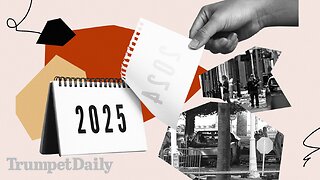Premium Only Content

Skids - Peel Session 1978......
Skids - Peel Session 1978......
-----------------------------------------------------------------------------------
WHY NOT SUPPORT MY CHANNEL BY BUYING ME A COFFEE AT
Ko-fi.com/punkrocknineteenseventies
-----------------------------------------------------------------------------------
CHECK OUT MY YOUTUBE CHANNEL / @punkrockuk1970s AND LIKE AND SUBSCRIBE, IT'S ALL FREE.
-----------------------------------------------------------------------------------
BEFORE YOU START READING PLEASE CAN YOU LIKE AND FOLLOW MY CHANNEL. IT WILL HELP GETTING MORE CONTENT TO THE CHANNEL, ENJOY.
-------------------------------------------------------------------------------------
John Robert Parker Ravenscroft OBE (30 August 1939 – 25 October 2004), better known as John Peel, was an English radio presenter and journalist. He was the longest-serving of the original disc jockeys on BBC Radio 1, broadcasting regularly from 1967 until his death in 2004.
Peel was one of the first broadcasters to play psychedelic rock and progressive rock records on British radio. He is widely acknowledged for promoting artists of many genres, including pop, dub reggae, punk rock and post-punk, electronic music and dance music, indie rock, extreme metal and British hip hop. Fellow DJ Paul Gambaccini described Peel as "the most important single person in popular music from approximately 1967 through 1978. He broke more important artists than any individual."[1]
Peel's Radio 1 shows were notable for the regular "Peel Sessions", which usually consisted of four songs recorded by an artist in the BBC's studios, often providing the first major national coverage to bands that later achieved fame. The annual Festive Fifty countdown of his listeners' favourite records of the year was a notable part of his promotion of new music.[2]
Peel appeared on television occasionally as one of the presenters of Top of the Pops in the 1980s, and provided voice-over commentary for a number of BBC programmes. He became popular with the audience of BBC Radio 4 for his Home Truths programme, which ran from the 1990s, featuring unusual stories from listeners' domestic lives.
------------------------------------
Skids are a Scottish punk rock and new wave band, formed in Dunfermline in 1977 by Stuart Adamson (guitar, keyboards, percussion and backing vocals), William Simpson (bass guitar and backing vocals), Thomas Kellichan (drums) and Richard Jobson (vocals, guitar and keyboards). Their biggest successes were the 1979 single "Into the Valley" and the 1980 album The Absolute Game. In 2016, the band announced a 40th-anniversary tour of the UK with their original singer Richard Jobson.[1]
History
Early years (1977–1979)
Skids played their first gig on 19 August 1977 at the Bellville Hotel in Pilmuir Street, Dunfermline, Scotland. Within six months they had released the Charles EP on the label No Bad records. The record brought them to the attention of national BBC Radio 1 DJ John Peel. This led to a local gig supporting The Clash. Virgin Records then signed up Skids in April 1978.[2] The singles "Sweet Suburbia" and "The Saints Are Coming" both made commercial inroads, before "Into the Valley" reached the top 10 in the UK Singles Chart in early 1979.[2] The band released their debut studio album, Scared to Dance, the same year.[2] It was recorded at The Townhouse Studios in London, England with production and keyboards by David Batchelor. Adamson walked out towards the end of the sessions before all the guitar overdubs were completed. Session guitarist Chris Jenkins was chief maintenance engineer at Townhouse Studios and completed the album using Adamson's studio set up, adding additional guitar to four tracks – "Into the Valley", "Integral Plot", "Calling the Tune" and "Scared to Dance". In the meantime, Adamson returned to Scotland when the recording was finished. He rejoined the band for the live concert tour promotion of the album. The record included "The Saints Are Coming",[2] which was later covered in late 2006 as a charity single by U2 and Green Day.
Skids enjoyed a further year of chart success as "Masquerade" and "Working for the Yankee Dollar" reached the top 20 in the UK chart.[2] The latter came from their second album, also released in 1979, Days in Europa, with the record's production and keyboards by Bill Nelson.[2][3] Just before recording of the album commenced, Kellichan left the band and was temporarily replaced on drums by Rusty Egan (ex-Rich Kids, then with the band Visage and a New Romantic 1980s dance DJ at the Blitz club).[2] Egan played on the album and later on the live concert tour of the record. Keyboard player Alistair Moore also temporarily joined the band to perform live with them. He had been recruited to play Bill Nelson's keyboard parts from the record. In November 1979, Mike Baillie, ex-Insect Bites, was recruited as a permanent band member, taking care of the drums, backing vocals and percussion).[2] He slowly took over from Egan, while the band was still touring Days in Europa. Some of Jobson's lyrics as well as the album cover caused controversy. It showed an Olympian being crowned with laurels by an Aryan-looking woman, and the lettering was in Gothic script. Some, including DJ John Peel, felt that this glorified Nazi ideology and it was indeed similar to posters from the 1936 Summer Olympics, held in Germany. After the original version of the album had already been released, Canadian record producer Bruce Fairbairn was brought into the project. The original cover and the track "Pros and the Cons" were removed. The sleeve was completely re-designed and the song "Masquerade" added. The album was also remixed and the tracks re-sequenced. This second version was released in 1980. One updated track, "The Olympian", was released on a flexi-disc single as a free gift with a March 1980 issue of Smash Hits.
The Absolute Game, Joy and break-up (1980–1982)
In February 1980, one of Skids' founding members, William Simpson, left and was replaced by Russell Webb (bass guitar, backing vocals, keyboards, percussion, and guitar).[2] Webb joined as a permanent band member and immediately started work on the recording of the band's third album The Absolute Game, released in 1980 and produced by Mick Glossop. It proved to be the band's most commercial release, reaching the top 10 of the UK Albums Chart and contained the minor hit single "Circus Games".[2] A few of the tracks on the album also included a collection of fourteen adult and child backing vocalists, along with a lone didgeridoo player. Initial copies of The Absolute Game came with a free limited edition, second album entitled Strength Through Joy, echoing the band's previous controversial themes. Jobson claims to have got the title from Dirk Bogarde's autobiography.
-
 LIVE
LIVE
Kim Iversen
4 hours agoNew Year, New PSYOP?: The Fort Bragg Connection In The New Years Terror Attacks
3,166 watching -
 1:41:18
1:41:18
Glenn Greenwald
4 hours agoTerror Attacks Exploited To Push Unrelated Narratives; Facing Imminent Firing Squad, Liz Cheney Awarded Presidential Medal | SYSTEM UPDATE #381
51K54 -
 1:02:38
1:02:38
Donald Trump Jr.
7 hours agoNew Year’s Terror, Latest Breaking News with Sebastian Gorka | TRIGGERED Ep.204
128K233 -
 59:59
59:59
The StoneZONE with Roger Stone
2 hours agoAfter Years of Targeting Trump, FBI and DOJ are Unprepared to Stop Terror Attacks | The StoneZONE
5.52K4 -
 LIVE
LIVE
Leonardaisfunny
1 hour agoH-1b Visas: Infinity Indians
522 watching -

Josh Pate's College Football Show
6 hours ago $0.07 earnedPlayoff Reaction Special: Ohio State Owns Oregon | Texas Survives | UGA vs Notre Dame Takeaways
4.9K1 -
 58:04
58:04
Kimberly Guilfoyle
5 hours agoFBI's Terror Response Failures, Live with Steve Friend & Kyle Seraphin | Ep. 185
84.8K36 -
 2:15:01
2:15:01
WeAreChange
6 hours agoMassive Developments In Vegas Investigation! UNREAL DETONATION, Shocking Details Emerge!
92.2K27 -
 54:02
54:02
LFA TV
13 hours ago2025 Is Off to a Violent Start | TRUMPET DAILY 1.2.25 7pm
32.5K4 -
 59:27
59:27
theDaily302
12 hours agoThe Daily 302- JJ Carrell
30.3K3